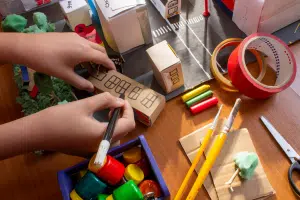
(Revised October 22, 2025)
After years of intense academic pressure pushing it out, play-based learning is making a vital, research-backed comeback in classrooms. This shift focuses on playful learning: a guided approach where educators facilitate activities to build essential skills. As noted by EdWeek, this return is driven by the need to develop the “unconstrained skills” vital for long-term success.
Here are the four key benefits of incorporating play-based learning into your curriculum:
- Strengthens Social-Emotional Learning (SEL): Play is a student’s first language for social development. It forces children to build relationships, negotiate roles, share, and manage conflict in a low-stakes setting. This practice in self-regulation and empathy directly supports SEL frameworks.
- Develops Robust Problem-Solving Skills: Play is applied problem-solving. Research cited in EdWeek found that guided play has a significant positive impact on early math skills, shape knowledge, and cognitive flexibility (the ability to switch tasks), often outperforming direct instruction in these areas. Whether building a tower or organizing a game, students are actively using executive functions.
- Provides Leadership Opportunities: In a play environment, children naturally take on different roles—the director, the planner, or the mediator. This dynamic allows students who may not excel in traditional academics to discover and practice leadership skills, take initiative, and guide their peers toward a shared goal.
- Boosts Critical and Creative Thinking: The academic push inadvertently led to passive, didactic instruction that stifled curiosity. Play-based learning reverses this by encouraging students to explore, experiment, and test “how the world works.” By asking guiding questions like, “What do you think will happen if you add this block on top?”, educators nurture the innate motivation to be a learner and foster agile, creative thinking.
If you need help incorporating play into your program’s lessons or creating a more balanced program, CSA Education is here to help. From preK–12, our staff and team of subject-area experts have experience developing lessons to create a positive classroom experience for all students. We are well-versed in SEL, and standards-based learning, ensuring the content we develop with your company checks all the boxes and meets your needs.












































